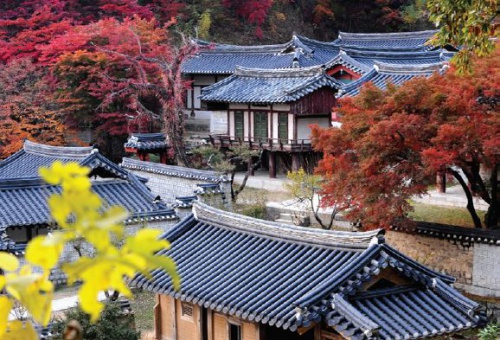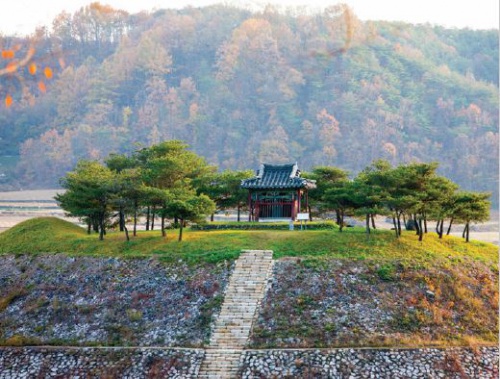"Korea's Religious Places - 2.4.3 Dosan Seowon (Andong, Gyeongsangbuk-do)"의 두 판 사이의 차이
(새 문서: ==Dosan Seowon (Andong, Gyeongsangbuk-do)== In many regards, the Dosan Seowon, built in 1574, is the most important seowon in Korea. It is featured on the KRW 1,000 note, both in reg...) |
잔글 (→Dosan Seowon (Andong, Gyeongsangbuk-do)) |
||
| 1번째 줄: | 1번째 줄: | ||
==Dosan Seowon (Andong, Gyeongsangbuk-do)== | ==Dosan Seowon (Andong, Gyeongsangbuk-do)== | ||
| − | In many regards, the Dosan Seowon, built in 1574, is the most important seowon in Korea. It is featured on the KRW 1,000 note, both in regard to its connections with Yi Hwang (1501–1570), who is the historical figure on the note, and because it is the painting of the Dosan Seodang (village school) and its surroundings that is featured on the reverse side of the note. Yi Hwang established the village school to devote himself to study and teaching, and it was elevated to the Dosan Seowon after his death. The Dosan Seowon is probably the most visited Confucian academy as well, even though it is relatively remote and hard to get to. It’s not on the way to any other place; if you go there, it’s because it is your primary destination, and there are numerous visitors. | + | In many regards, the Dosan Seowon, built in 1574, is the most important ''seowon'' in Korea. It is featured on the KRW 1,000 note, both in regard to its connections with Yi Hwang (1501–1570), who is the historical figure on the note, and because it is the painting of the Dosan Seodang (village school) and its surroundings that is featured on the reverse side of the note. Yi Hwang established the village school to devote himself to study and teaching, and it was elevated to the Dosan Seowon after his death. The Dosan Seowon is probably the most visited Confucian academy as well, even though it is relatively remote and hard to get to. It’s not on the way to any other place; if you go there, it’s because it is your primary destination, and there are numerous visitors. |
| − | The Dosan Seowon has one feature different from most: it was built on the grounds of the scholar’s residence. Most seowon are located in picturesque locations, somewhat removed from villages and residences. Not the Dosan Seowon. While the setting is picturesque, it is on the very site of the residence of Yi Hwang, built just behind the house where Yi Hwang once lived and taught. In fact, one of the more striking aspects of this site is Yi Hwang’s humble home. It is not large by any stretch and bespeaks the antimaterialism of Confucianism. But the interesting thing is the addition to the porch of his house—the extension of the porch and of the roof over the porch so that another six or eight students might sit and study with the master. | + | The Dosan Seowon has one feature different from most: it was built on the grounds of the scholar’s residence. Most ''seowon'' are located in picturesque locations, somewhat removed from villages and residences. Not the Dosan Seowon. While the setting is picturesque, it is on the very site of the residence of Yi Hwang, built just behind the house where Yi Hwang once lived and taught. In fact, one of the more striking aspects of this site is Yi Hwang’s humble home. It is not large by any stretch and bespeaks the antimaterialism of Confucianism. But the interesting thing is the addition to the porch of his house—the extension of the porch and of the roof over the porch so that another six or eight students might sit and study with the master. |
| − | <gallery align="center" widths="500px" heights="400px" caption="Dosan Seowon (left) and a distant view of Sisadan Stele from the seowon"> | + | <gallery align="center" widths="500px" heights="400px" caption="Dosan Seowon (left) and a distant view of Sisadan Stele from the ''seowon''"> |
File:UKS06_Korea's Religious Places_img_54.jpg | File:UKS06_Korea's Religious Places_img_54.jpg | ||
File:UKS06_Korea's Religious Places_img_55.jpg | File:UKS06_Korea's Religious Places_img_55.jpg | ||
| 12번째 줄: | 12번째 줄: | ||
| − | The Dosan Seowon, like the house of Yi Hwang, is of a humble scale. The educational buildings and dormitories behind the house are smaller than those found at most seowon, and the facilities are somewhat crowded onto the hillside behind the house. The earlier Sosu Seowon is set in the bottom of a valley, on the banks of a stream, and has open spaces. But the Dosan Seowon is set on a steep hillside where one climbs stairs to the house, more stairs to the school, and up a steep set of stairs to the shrine. The scene to the front is beautiful today because it overlooks the reservoir created by the Andong Dam, but traditionally it overlooked a beautiful valley. | + | The Dosan Seowon, like the house of Yi Hwang, is of a humble scale. The educational buildings and dormitories behind the house are smaller than those found at most ''seowon'', and the facilities are somewhat crowded onto the hillside behind the house. The earlier Sosu Seowon is set in the bottom of a valley, on the banks of a stream, and has open spaces. But the Dosan Seowon is set on a steep hillside where one climbs stairs to the house, more stairs to the school, and up a steep set of stairs to the shrine. The scene to the front is beautiful today because it overlooks the reservoir created by the Andong Dam, but traditionally it overlooked a beautiful valley. |
2017년 1월 17일 (화) 23:53 판
Dosan Seowon (Andong, Gyeongsangbuk-do)
In many regards, the Dosan Seowon, built in 1574, is the most important seowon in Korea. It is featured on the KRW 1,000 note, both in regard to its connections with Yi Hwang (1501–1570), who is the historical figure on the note, and because it is the painting of the Dosan Seodang (village school) and its surroundings that is featured on the reverse side of the note. Yi Hwang established the village school to devote himself to study and teaching, and it was elevated to the Dosan Seowon after his death. The Dosan Seowon is probably the most visited Confucian academy as well, even though it is relatively remote and hard to get to. It’s not on the way to any other place; if you go there, it’s because it is your primary destination, and there are numerous visitors.
The Dosan Seowon has one feature different from most: it was built on the grounds of the scholar’s residence. Most seowon are located in picturesque locations, somewhat removed from villages and residences. Not the Dosan Seowon. While the setting is picturesque, it is on the very site of the residence of Yi Hwang, built just behind the house where Yi Hwang once lived and taught. In fact, one of the more striking aspects of this site is Yi Hwang’s humble home. It is not large by any stretch and bespeaks the antimaterialism of Confucianism. But the interesting thing is the addition to the porch of his house—the extension of the porch and of the roof over the porch so that another six or eight students might sit and study with the master.
- Dosan Seowon (left) and a distant view of Sisadan Stele from the ''seowon''
The Dosan Seowon, like the house of Yi Hwang, is of a humble scale. The educational buildings and dormitories behind the house are smaller than those found at most seowon, and the facilities are somewhat crowded onto the hillside behind the house. The earlier Sosu Seowon is set in the bottom of a valley, on the banks of a stream, and has open spaces. But the Dosan Seowon is set on a steep hillside where one climbs stairs to the house, more stairs to the school, and up a steep set of stairs to the shrine. The scene to the front is beautiful today because it overlooks the reservoir created by the Andong Dam, but traditionally it overlooked a beautiful valley.

